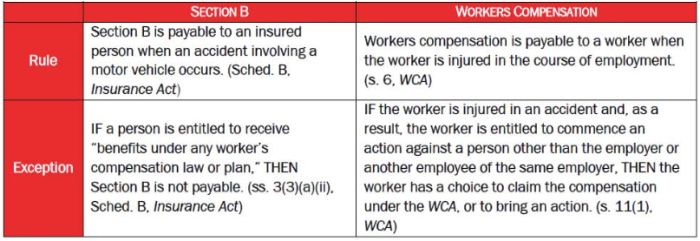Field v Aviva Insurance Company, 2024 PESC 8.
Though it reads as a clarication of the operation of a statute, the Supreme Court of Prince Edward Island's recent decision in Field v Aviva Insurance Company carries with it the potential to impact auto insurance throughout the province. Those most directly aected are insurers and workers injured in the course of employment when the accident involves a motor vehicle. The outcome of this decision is unique to PEI.
The court held that the plainti, Mr. Field, was entitled to Section B benets even though he was entitled to claim compensation under the Workers Compensation Act ("WCA").
Synopsis
Mr. Field was injured in a motor vehicle accident that occurred while Mr. Field was acting in the course of his employment. Mr. Field's employer was insured by the Defendant, Aviva Insurance Company, and at the time of the accident, Mr. Field was an insured under that policy. The accident involved the use of a motor vehicle and occurred in the course of Mr. Field's employment. Therefore, the WCA and the Insurance Act (specically "Section B") were automatically engaged.
Issue
Is a worker who was injured in an accident involving a motor vehicle and has elected to commence a civil action entitled to claim Section B benets?
Analysis
Resolving the issue required an analysis of the interaction between the two statutes, and specically, the interaction of exceptions and exclusions clauses in each statute. The relevant concepts are:

The court was concerned specically with the implications of the Section B exception (above) and accidents that meet the workers compensation exception (above) and involved the use of a motor vehicle. In such a scenario, s. 11(5) of the WCA is also engaged.
Section 11(5) states that when an accident meeting the exception in the WCA occurs, and the accident involved the use of a motor vehicle, then, for the purposes of the Insurance Act and any other contract of insurance in eect at the time of the accident, the injured worker is deemed not to be entitled to compensation under the WCA.
Decision
- The court considered the submissions of the parties, interpreted the meaning and purpose of the legislation, ultimately concluding that there is no genuine ambiguity arising from interpreting s. 11(5) of the WCA, and that the deeming provision in it has the eect of making the Section B exclusion inapplicable.
- The court was mindful that this outcome would be unique to Prince Edward Island, but also noted that such an outcome is reective of the choices of the legislature, that this "is not the rst time that the Legislature has made a choice unique to Prince Edward Island," and ultimately, that "the court must respect the drafting choices made by the Legislature."
- Field is therefore entitled to Section B benets.
Takeaways
- The court's decision concerns a worker that elected to commence an action, pursuant to section 11(1) and 11(5) of the WCA. In that instance, the court determined Section B is payable in PEI.
- The language in the WCA, and the logic applied by the court in interpreting it, leaves a curious situation. If the worker elects to claim the compensation under the WCA, there is room to argue that the worker is also entitled to Section B. Though the court seems to foreclose such an outcome, (at ¶47-50, 53) this was not the specic question the court was asked to decide.
The content of this article is intended to provide a general guide to the subject matter. Specialist advice should be sought about your specific circumstances.

